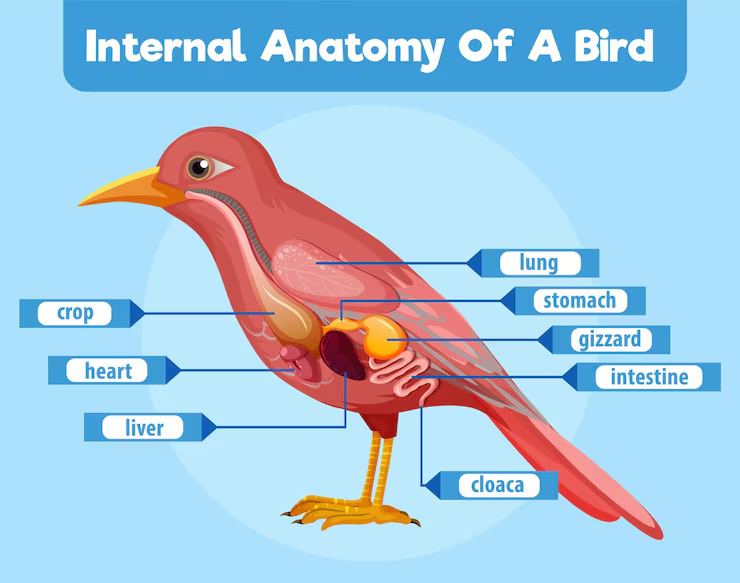When you hear about bird flu, it’s natural to feel concerned, especially with the well-being of your loved ones at stake. The good news is that understanding how to treat bird flu in humans can empower you to take the right steps if ever faced with this situation.
Picture the peace of mind knowing exactly what to do and how to protect yourself and those around you. In this guide, you’ll discover practical treatments and important precautions. By the end, you’ll be equipped with the knowledge to handle this flu with confidence and care.
Ready to dive in and safeguard your health? Keep reading to find out more!
Symptoms Of Bird Flu
Bird flu is a virus that affects birds and can infect humans. It can cause mild to serious illness.
Knowing the symptoms helps in early detection and treatment. Symptoms vary from mild to severe.
Early Signs
Early signs of bird flu in humans are like regular flu symptoms. They appear within a few days after infection.
Common early signs include fever, cough, and sore throat. Some people also feel tired and have muscle pain.
- Fever over 100.4°F (38°C)
- Cough and sore throat
- Runny or stuffy nose
- Body aches and fatigue
- Headache
Severe Symptoms
Severe bird flu symptoms need immediate medical care. They can affect breathing and other organs.
These symptoms may appear if the infection worsens. They show the virus is causing serious harm.
- Difficulty breathing or shortness of breath
- Chest pain or tightness
- Severe cough with mucus or blood
- Sudden dizziness or confusion
- Persistent vomiting or diarrhea

Credit: m.economictimes.com
Medical Treatments
Treating bird flu in humans requires medical care to stop the virus. Early treatment helps reduce symptoms and complications.
Doctors use different methods depending on how severe the illness is. Treatment aims to control the infection and support the patient’s health.
Antiviral Medications
Antiviral drugs help fight the bird flu virus in the body. They work best when started early after symptoms begin.
Common antiviral medicines include oseltamivir and zanamivir. These reduce the virus’s ability to multiply.
- Start treatment within 48 hours of symptoms
- Take the full course as prescribed
- Watch for side effects like nausea or dizziness
Hospital Care
Severe bird flu cases may need hospital care. Doctors monitor breathing and organ function closely.
Patients might receive oxygen or help with breathing if needed. Hospitals have equipment to support critical patients.
- Oxygen therapy for low oxygen levels
- Intensive care for severe breathing problems
- Close monitoring of vital signs
Supportive Therapies
Supportive therapies help the body fight infection and heal. These include rest and fluids to prevent dehydration.
Doctors may give medicines to control fever and pain. Nutritional support helps the immune system stay strong.
- Drink plenty of fluids
- Take fever reducers like acetaminophen
- Get plenty of rest
Home Remedies
Bird flu in humans can cause fever, cough, and body pain. Along with medical care, some home remedies may help ease symptoms.
These remedies support your body while it fights the virus. Use them carefully and always follow your doctor’s advice.
Rest And Hydration
Rest helps your body heal and fight the infection. Avoid physical activities and get plenty of sleep.
Drinking fluids keeps you hydrated and helps loosen mucus. Water, herbal teas, and clear soups are good choices.
- Drink at least 8 glasses of fluids daily
- Sleep 7 to 9 hours every night
- Take short naps if you feel tired during the day
Nutritional Support
Good nutrition strengthens your immune system. Eat foods rich in vitamins and minerals to help your body recover.
Fresh fruits and vegetables provide important nutrients. Include protein sources like eggs, beans, and lean meat.
- Eat citrus fruits for vitamin C
- Include leafy greens for iron and vitamins
- Choose whole grains for energy
- Have protein with every meal
Natural Remedies
Some natural remedies may ease bird flu symptoms. Use them gently and watch for any side effects.
Honey, ginger, and garlic have antiviral and soothing properties. Herbal teas can calm a sore throat and reduce cough.
- Drink warm ginger tea to reduce inflammation
- Take honey with warm water to soothe the throat
- Add garlic to meals for immune support
- Use steam inhalation with eucalyptus oil for congestion

Credit: epi.utah.gov
Preventive Measures
Bird flu can spread from birds to humans and cause illness. Taking steps to prevent infection is very important.
Good habits and safety actions help reduce the risk of catching bird flu. These measures protect your health.
Personal Hygiene
Washing hands often stops the spread of germs. Use soap and water for at least 20 seconds.
Avoid touching your face with unwashed hands. Cover your mouth and nose when coughing or sneezing.
- Wash hands after contact with birds or their droppings
- Use hand sanitizer if soap is not available
- Keep nails short and clean
- Wear gloves if handling birds
Avoiding Exposure
Stay away from live poultry markets and farms where bird flu is found. Avoid touching sick or dead birds.
Use protective gear if you must be near birds. Keep your living area clean and free from bird droppings.
- Do not eat or handle raw poultry without cooking it well
- Avoid places with many birds during outbreaks
- Wear masks and gloves when in risky areas
- Keep pets away from wild birds
Vaccination Options
Vaccines can help protect people at high risk of bird flu infection. They prepare the body to fight the virus.
Speak with health professionals about available vaccines. Vaccines may not be needed for everyone.
- Seasonal flu vaccines do not protect against bird flu
- Specific bird flu vaccines exist for some strains
- Vaccines are usually recommended for poultry workers
- Follow local health advice about vaccination
When To Seek Medical Help
Bird flu can cause serious illness in humans. Knowing when to get medical help is very important. Early treatment can improve recovery chances.
If you have been near birds or areas where bird flu is found and feel sick, watch your symptoms closely. Seek help if warning signs appear.
Warning Signs
Look for these warning signs after exposure to bird flu. These symptoms show the infection may be serious and need medical care.
- High fever above 101°F (38.3°C)
- Persistent cough or difficulty breathing
- Chest pain or tightness
- Severe fatigue or weakness
- Muscle aches and body pain
- Headache with confusion
- Sudden dizziness or fainting
Emergency Situations
Some conditions need urgent medical attention. Call emergency services or visit the hospital right away if these happen.
| Emergency Sign | Action to Take |
| Difficulty breathing or shortness of breath | Go to emergency room immediately |
| Chest pain or pressure | Call emergency services |
| Sudden confusion or trouble waking up | Seek urgent medical care |
| Blue lips or face | Get emergency help right away |
| Severe vomiting or inability to keep fluids | Visit hospital quickly |
Managing Bird Flu Complications
Bird flu can cause serious health problems in people. Treating these complications quickly helps recovery.
Doctors focus on managing problems like infections and breathing difficulties. Care depends on symptoms and severity.
Secondary Infections
Bird flu weakens the immune system. This makes people more likely to get other infections. These can be bacterial or fungal.
- Doctors use antibiotics to fight bacterial infections.
- Antifungal medicines help if fungal infections appear.
- Monitoring for new symptoms is important.
- Good hygiene reduces the risk of more infections.
Respiratory Issues
Bird flu often causes lung problems. Patients may have trouble breathing or develop pneumonia.
| Treatment | Description |
| Oxygen Therapy | Helps patients breathe easier |
| Mechanical Ventilation | Used if breathing is very difficult |
| Anti-inflammatory Drugs | Reduce lung swelling and pain |
| Regular Monitoring | Tracks lung function and adjusts care |

Credit: www.youtube.com
Frequently Asked Questions
What Are Common Treatments For Bird Flu In Humans?
Bird flu treatment includes antiviral medications like oseltamivir. Early medical care improves recovery chances. Supportive care such as fluids and rest is essential. Hospitalization may be necessary for severe cases.
How Soon Should Bird Flu Be Treated?
Treatment should start within 48 hours of symptom onset. Early antiviral use reduces complications and severity. Delay in treatment can worsen outcomes. Prompt medical attention is critical.
Can Antibiotics Cure Bird Flu Infections?
No, antibiotics do not treat bird flu. Bird flu is caused by a virus, not bacteria. Antiviral drugs are used to fight the infection. Antibiotics may be prescribed only for secondary bacterial infections.
Is Hospitalization Necessary For Bird Flu Patients?
Hospitalization depends on illness severity and symptoms. Severe respiratory distress or complications require hospital care. Mild cases can be managed at home with monitoring. Medical evaluation guides the need for hospitalization.
Conclusion
Treating bird flu in humans requires quick medical care and rest. Doctors may use antiviral medicines to fight the virus. Drinking plenty of fluids helps the body stay strong. Avoid spreading the infection by staying home and covering coughs. Watch for serious symptoms like trouble breathing or high fever.
Early action can prevent the illness from getting worse. Always follow your healthcare provider’s advice carefully. Staying informed about bird flu helps protect you and others. Simple steps make a big difference in recovery and health.





